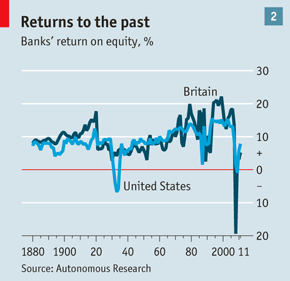shenxiaoqiang 发表于 2012-5-7 12:26 
我想问一下您:
1.美国通过量化宽松注入流动性和欧洲央行向银行提供大量贷款增大流动性有什么区别?? ...
我的几点看法:
1. 美联储的QE和欧洲央行购买大量欧洲国家债券的公开市场操作(我听到的版本是欧洲央行向欧洲本地银行海量收购金猪五国的债券),是两个目的不同的行为。 美国和欧洲面临不同的问题。美国已经过了最危险的阶段,美国国债需求从来没有跌过,事实上标普下调美国国债评级以后收益率居然还降了,QE目的是刺激本土制造业和创业投资,以拉动经济回升,从而带来就业,就业就业就业,这是QE的主题,这是最简单最教科书的货币政策,利用美元无耻的世界货币地位,来减缓债务,实现通胀和就业。欧洲就苦逼了,他们的银行摇摇欲坠,如果我的养老基金经理和我说他打算买点西班牙,或者希腊,或者爱尔兰的国债,我会宰了他的。金猪五国别说什么刺激投资了,他们的融资成本高的离谱,失业率高到经济学家都懒得来谈论它了,欧洲央行是定向的海量买国债,以保证这五头猪的国债收益不会通天了,欧洲现在就是莱曼兄弟倒闭后的美国,国家都要倒闭了,先稳定住全世界人民对欧洲的信心是关键。要保证五个国家,主权信用不能倒闭(希腊估计不行了),要保证持有大量欧债多头的银行(德银,瑞银)能通过Solvency II,要保证要命的养老基金不破产,这是欧洲央行的目的,所以他是有目的的收购五个国家债券的,不是广义上发放欧元(虽然也的确导致了欧元供给上升)。欧洲央行的行为配合着政治上五头猪财政改革的进程,控制在德法手上的欧洲央行是强迫金猪五国接受财政改革的筹码。悲伤的是,欧元在全球范围内的储备不够,所以欧洲的债务是不会随着欧元超发而自动降低的(美帝就不同了,中国外汇的缩水就是他们的幸福),所以欧洲央行要组建那个欧洲金融稳定基金,求爷爷求奶奶的要中国,日本去购买。一个为了就业,一个为了五头猪不倒闭,这是关键区别。
2.职员的薪酬是股东说了算的,但是,是由就业市场决定的。让我们来看看华尔街的就业市场,高盛半年财报据说亏损20%,但是光头布朗查德还是拿着大把把的money,这到底是为甚么?!首先,投资银行业的薪酬是没有下降的,已经回复金融危机前的水平,但是利润率下降了?怎么办呢,裁员,是的,裁员,或许我们不该盯着那几个CEO,渣打,花旗,摩根的欧美业务都快裁得只剩孕妇了,进一步的你该知道,更多更多的中小投行都倒闭了,全部雇员遣散了,这是投资银行就业市场的全貌,你所希望的实实在在发生着,经济定律也在发挥作用,媒体不来报道而已。那些CEO是特例,他们一直就高得离谱,你不得不承认投资银行是人脉行业,那些CEO的就业市场和普通雇员是隔离的,光头布朗查德在金融危机之后去见巴菲特要钱,居然要到了,稳住了高盛的股价,这就是人脉,利润率下降,行业不景气,没关系,边际成本等于边际收入,你不雇佣布朗查德我无所谓,但高盛的股东会亏损得更多
3.巴塞尔三的细节我一无所知,我本人是个精算师,对养老金的行业标准是Solvency II,也是金融危机之后出来的监管条例,之前版本自然是 Solvency I。Solvency II出来以后所有在市场上有点名头的哥们都跳出来说,好牛逼啊好牛逼,好碉堡啊好碉堡,但是这其中有很多细节,比如资本充足率里,核心资本的定义,比如资本缓冲率的计算,允许各大养老基金采用内部的模型,再比如那永远都数不完的表外资产。让我们来读读历史,巴塞尔二是怎么来的,互联网泡沫之后和东南亚金融危机之后,02年推出的巴塞尔二(实际筹备工作98年就开始了), “与1988年资本协议相比,新资本协议的内容更广、更复杂。这是因为新协议力求把资本充足率与银行面临的主要风险紧密地结合在一起,力求反映银行风险管理、监管实践的最新变化,并尽量为发展水平不同的银行业和银行监管体系提供多项选择办法。巴塞尔委员会彻底修改资本协议的工作是从1998年开始的。1999年6月,巴塞尔委员会提出了以三大支柱——资本充足率、监管部门监督检查和市场纪律为主要特点的新资本监管框架草案第一稿,并广泛征求有关方面的意见”
眼熟吧,现在这一切又开始了,更广更复杂,把资本充足率和银行风险更更更更加紧密结合的巴塞尔协议第三季就要来了,现在开始广泛的征求意见咯,亲。我没有质疑协议制定者专业能力的意思,他们所提出的新的资本充足率“银行的核心资本充足率将由目前的4%上调到6%,同时计提2.5%的防护缓冲资本和不高于2.5%的反周期准备资本”肯定是基于反复推敲的假设和专业化的设计的,但这不是关键。之所以引起这么多的讨论是因为,这一假设对银行赢利有直接影响,考虑到杠杆率,这意味着银行得损失很多本来能赚钱的资本,而且这一数字本身很容易引起争论,很多细节假设可以修改(你知道,那些大的原则从来没人反驳的,而算出来的数字就容易攻击多了)。来,回忆一下金融危机,莱曼,AIG是因为没有足够的风险边际而隔屁的吗?开玩笑,当时莱曼大多数资本都是表外的信用违约掉期,压根和上一期的4%无关,不加入计算,AIG的风险头寸因为评级机构科幻小说般的全A评级,怎么算都是合规的,是的,和那些数字无关,怎么执行才是关键。事实上,如果标普把所有垃圾债券都评成AAA, 那什么资本充足率根本是浮云,当金融市场坍塌的时候,多出个4%的现金持有有个屁用。





 扫码加好友,拉您进群
扫码加好友,拉您进群




 收藏
收藏

